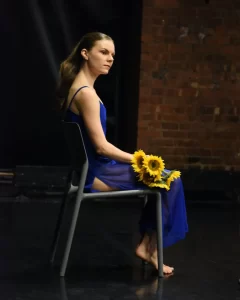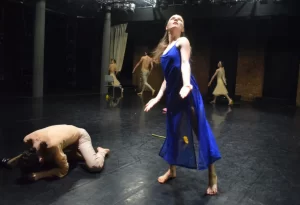By Madelaine Burnett
My natural stage presence is positive, even playful, but dancing in Echoes of War, inspired by the Russian invasion of Ukraine, required something more delicate and subtle. Over the rehearsals and performances, I found myself growing as a dancer, and as a person.
The choreography was by Alison Cook-Beatty, created for her New York company, Alison Cook Beatty Dance, which I have been a member of since 2021. Echoes of War, which premiered at Gibney Dance’s studio theatre in April 2022, focusses on how the tragic experience of war is impacting the children of Ukraine.

My role was the Girl in Blue, who the audience sees in the opening scene curled up alone on a train, holding a bouquet of sunflowers, surrounded by people who are desperate to escape. Alison told us that my leading role was inspired by the image of the three-year-old Jewish girl in red from Schindler’s List, whose town is destroyed by the Nazis; she wearsthe only splash of colour in the otherwise black-and-white movie. Alison was also inspired by an 11-year-old Ukrainian boy who travelled 600 miles alone, fleeing from his home near the Zaporizhzhia Nuclear Power Station seized by Russia in March 2022.
As part of the rehearsal process, we studied the current happenings in Europe, specifically those of Ukrainian residents fleeing their country by train. I also drew from my grandmother’s childhood experiences at the end of World War Two when she was expelled with her family, together with all German-speaking residents, from their home country of Sudetenland and herded onto a train to Germany. I thought, too, of the challenges of leaving my hometown of Vancouver, Canada, to come to the United States as a teenager fresh out of high school in pursuit of my dreams as a dancer. I missed and worried about my family, feeling helpless at the distance between us. In rehearsal and onstage, thinking of these things triggered a change in my posture and breath, helping me interpret the choreography as I tried to express some of the trauma suffered by children during war.
Throughout the 10-minute piece, set to Different Trains: After The War by Steve Reich, the seven other dancers and I intertwine and separate, riding the same passing trains, each on our own journey. As the music shifts in tone, Alison’s choreography is like a camera lens, zooming in and out, illuminating individual stories of fallen soldiers or families torn apart by war.
To portray the Girl in Blue’s youthful spirit in a carefree solo when she is still unaware of the grim reality around her, I imagine myself in the centre of a beautiful open field. I give my jumps and balances the airy quality of a bird. I lift my sternum to the sky to turn with abandon, spotting only the ceiling so that my natural momentum informs the movement. Initiating movement from my torso — from my back, pelvis, and solar plexus — I let my limbs organically follow as I dance in my character’s dreamworld.
In the final scene, the Girl in Blue’s childhood abruptly ceases as reality sets in. She drops the bright bouquet. For me, dancing this solemn ending is about honouring the Ukrainian people who are still suffering the brutality of the Russian invasion. Echoes of War also says something about love, longing, and how we should all care for the world’s children.

Source: https://danceinternational.org/life-moves-my-journey-through-echoes-of-war/?mibextid=Zxz2cZ

